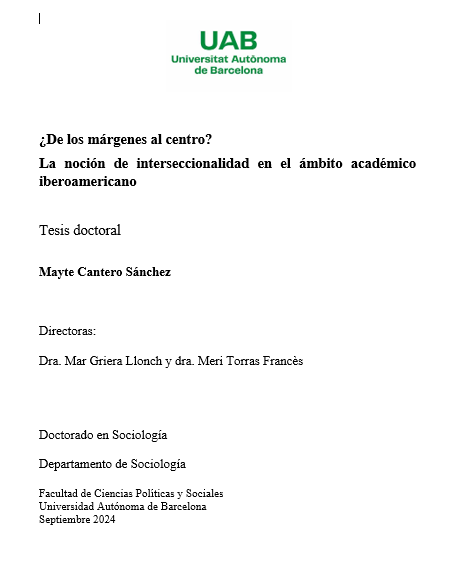Doctoral thesis defense of Mayte Cantero Sánchez
De los márgenes al centro: La noción de interseccionalidad en el ámbito académico iberoamericano

Summary of the Thesis: "From the Margins to the Center? The Notion of Intersectionality in the Ibero-American Academic Sphere"
In 1989, Kimberlé Crenshaw coined the term "intersectionality" to describe the inseparable link between racism and sexism in the discrimination experienced by women of color. This concept, developed from Black feminism and Critical Race Theory in the United States, has become a key tool for understanding the multiple and simultaneous oppressions faced by marginalized groups.
The research focuses on how intersectionality has been conceptualized, circulated, and used in the Ibero-American academic context, with an emphasis on the political challenges of its adoption. It does not aim to argue for or against the term but to refine its contours and migrations within this sphere. The research question is: How is the concept of intersectionality conceptualized, circulated, and used in the Ibero-American academic context?
General Objective: To analyze the processes of reception, shifts, and reconceptualization of the notion of intersectionality in Ibero-American academia, with a focus on the political challenges involved.
Theoretical Framework: Crenshaw’s work builds on earlier theories from African American feminists like bell hooks and Angela Davis, who criticized the universalization of "gender" and the racial privileges of second-wave white feminism. The concept of intersectionality has evolved and been questioned by Latin American feminists, who criticize its Eurocentrism and the lack of racial focus in European contexts.
Methodological Considerations: The thesis employs a qualitative methodology with some quantitative elements, including a systematic literature review, surveys, and semi-structured interviews. Databases were created on the academic production of intersectionality in Spanish- and Portuguese-speaking realms to analyze how academic knowledge is influenced by institutional demands and intellectual trends.
Chapter 4: Intersectionality in the Spanish-Speaking Realm This chapter analyzes the critical reception of the term in Hispanic America and Spain, highlighting the role of race and how academics perceive the concept in their research.
Chapter 5: Intersectionality in the Portuguese-Speaking Realm This chapter characterizes academic production in Brazil and Portugal, exploring how researchers perceive intersectionality and emphasize the racial context. Significant differences in the term’s application are identified between the two contexts.
General Discussion: The research reveals that intersectionality has been adapted in diverse ways in Ibero-American academia, deviating from its original conceptualization by Crenshaw. While its use is growing exponentially, its full integration into methodology and data analysis remains limited. The differences in the term's reception reflect diverse political agendas and conceptual tensions.
In Spanish literature, intersectionality mainly focuses on gender, often sidelining race, while Portuguese literature gives more balanced attention to race and gender. These differences are explained by the predominance of white cisgender women authors and the historical context of racial ideologies in Latin America and the Iberian Peninsula, which hinder critical approaches to race and racism.
The thesis concludes that intersectionality is more of a tool or perspective than a discipline in itself. A strengthening of links between Black epistemologies in the United States and decolonial epistemologies in theoretical, methodological, and political contexts is anticipated.
Date: 03/12/2024
Hour: 11 h
Place: Sala Graus (Fac. Ciències Polítiques i Sociologia)